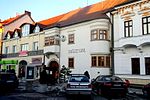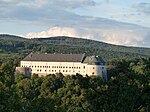Koncert mladosti (literally Concert of Youth) was Czechoslovak music festival, only two editions of which were held in 1976 and 1977 at the amphitheater in Pezinok, Slovakia. The main organizers of the events were Pavol Boriš and Ladislav Snopko, and the festival was the first open-air festival in Czechoslovak Socialist Republic ever. The music columnist Lubomír Dorůžka called him "Czechoslovak Woodstock" (Slovak: československý Woodstock).Koncerty mladosti were an unprecedented cultural event, where top Czech-Slovak representatives of folk, rock and jazz performed – among other folk singers and Vladimír Merta, Petr Lutka, Vlasta Třešňák, Vladimír Veit, Pepa Nos, Miloš Janoušek, Dagmar Andrtová and Zuzana Homolová, folk-rock band Marsyas, rock Collegium musicum, Jaro Filip, Vladimir Mišík's band Etc... debut concert, pop-rock Modus, jazzmen Gabriel Jonáš and Pavol Kozma, jazz-rock bands Bohemia and Energit, including an offshoot, the Andršt/Viklický duo. The state media called the festival the festival of defiance against red normalization regime, the entrance fee cost 25 Kčs and during both years it was visited by 4,500 people.In 1977, the moderators of the festival were Ladislav Snopko and Slávek Jíša. After Jaroslav Hutka sang the song "Havlíčku Havle", the visitors were anti-Bolshevik and thought about marching "against everything". The presenters calmed the situation by showing the film Yellow Submarine by the British music group The Beatles, which began with the notes of the French national anthem and the song "All You Need Is Love".In 1978, a third year of the festival was planned, but it was eventually cancelled.The atmosphere of the events was captured by photographer Ján Štrba and they were part of various commemorative exhibitions and books. Author of the posters of both years is Oliver Solga.In 2007, memorial concert in Schaubmar's Mill was organized by P.R.D. civil association, during which the new book Koncert mladosti '76 – '77 – Československý Woodstock was baptized. In 2016 was held six-hours long Koncert mladosti 40 event.











